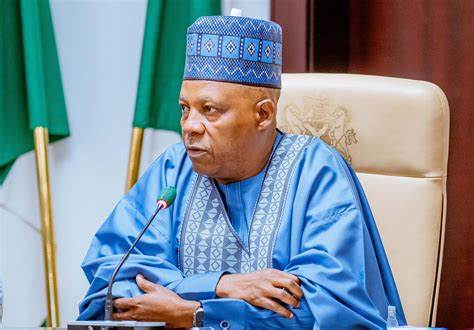The Presidency has dismissed claims that Vice President Kashim Shettima’s remarks at a book launch in Abuja were connected to recent political developments in Rivers State involving Governor Siminalayi Fubara and President Bola Tinubu.
Stanley Nkwocha, Senior Special Assistant to the President on Media and Communications in the Office of the Vice President, issued a statement on Friday rejecting media interpretations that linked the Vice President’s historical references to current political events.
During the public presentation of “OPL 245: The Inside Story of the $1.3 Billion Oil Block,” authored by former Attorney General Mohammed Bello Adoke (SAN), Shettima had referenced a historical episode from the Jonathan administration when there were attempts to remove him as Governor of Borno State during the height of the Boko Haram insurgency.
Nkwocha described media interpretations as “gross misrepresentation” and “reckless endangerment of national cohesion.” He accused some news outlets of irresponsibly twisting Shettima’s account of how the former Goodluck Jonathan administration had floated the idea of removing him from office as Borno governor during the most critical phase of the Northeast insurgency.
“The sensational reporting disappointingly tried to erect a highly mendacious argument about the state of emergency declared in Rivers State and the subsequent suspension of Governor Siminalayi Fubara by His Excellency, Asiwaju Bola Ahmed Tinubu,” Nkwocha stated.
The presidential aide emphasized that Shettima’s comments were made within the specific context of acknowledging the book author’s past professional conduct during his tenure as Attorney General. “His remarks were historical references to events that occurred during the Jonathan administration, and constituted nothing more than an intellectual discourse on Nigeria’s constitutional evolution,” he explained.
Nkwocha characterized the moment as “purely illustrative, intended to demonstrate how our constitutional democracy has matured within the capacity to resolve complex federal-state tensions through established legal mechanisms.”
The statement also clarified the nature of President Tinubu’s action regarding Governor Fubara, emphasizing that it was a suspension rather than outright removal from office. “For the avoidance of doubt, President Tinubu did not remove Governor Fubara from office. The constitutional action taken was suspension, and not outright removal,” Nkwocha stated.
He explained that the suspension was part of measures implemented, including the declaration of a state of emergency, in response to grave circumstances surrounding the polity in Rivers State. The presidential aide noted the unprecedented situation where the State House of Assembly complex was under demolition and Governor Fubara was facing a looming threat of impeachment from embattled members of the state legislature.
Defending the legality of President Tinubu’s intervention in Rivers State, Nkwocha noted that it was conducted in accordance with Section 305 of the 1999 Constitution following security threats and political instability in the state. “President Tinubu followed the constitutional process with honest precision. The President’s proclamation properly invoked Section 305(2), which was subsequently ratified by an overwhelming bipartisan majority in the National Assembly,” he stated.
The clarification comes amid ongoing political tensions in Rivers State and attempts by various stakeholders to interpret recent statements by government officials in the context of the crisis.

















